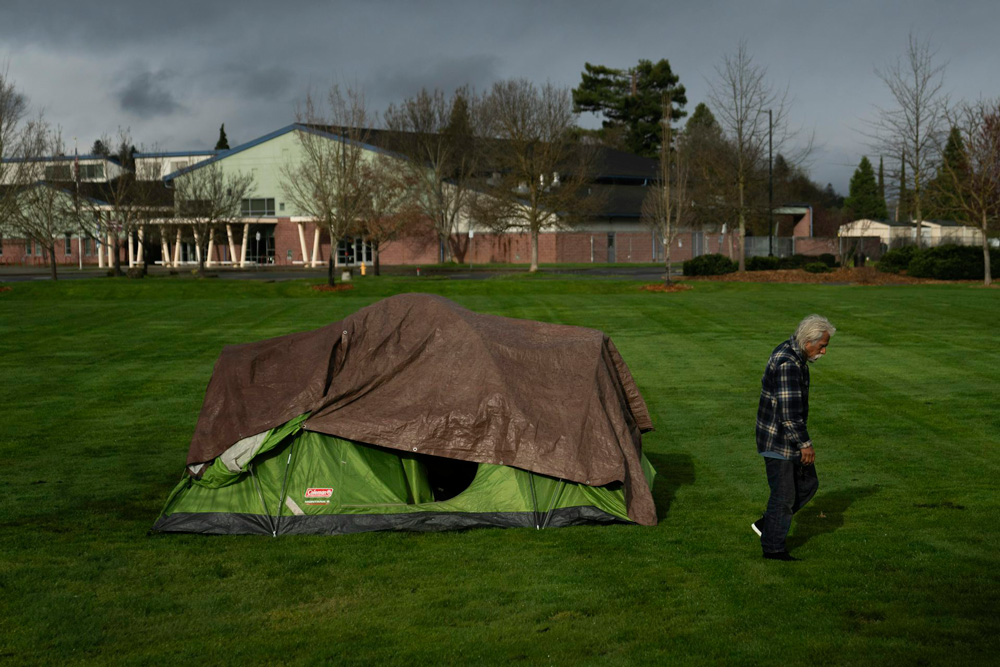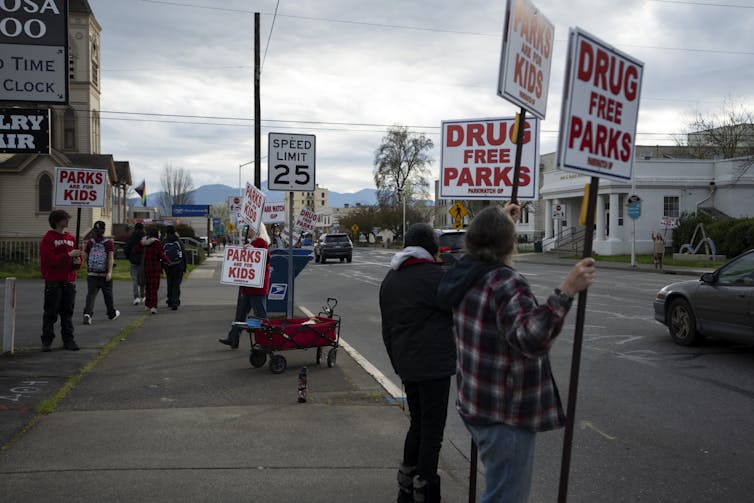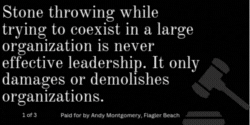
By Clare Pastore
On April 22, 2024, the Supreme Court will hear a case that could radically change how cities respond to the growing problem of homelessness. It also could significantly worsen the nation’s racial justice gap.
City of Grants Pass v. Johnson began when a small city in Oregon with just one homeless shelter began enforcing a local anti-camping law against people sleeping in public using a blanket or any other rudimentary protection against the elements – even if they had nowhere else to go. The court must now decide whether it is unconstitutional to punish homeless people for doing in public things that are necessary to survive, such as sleeping, when there is no option to do these acts in private.
[Florida enacted a law banning the homeless from sleeping on public grounds in the last legislative session despite opposition from local governments, who find the law’s requirements burdensome.]
The case raises important questions about the scope of the Constitution’s cruel and unusual punishment clause and the limits of cities’ power to punish involuntary conduct. As a specialist in poverty law, civil rights and access to justice who has litigated many cases in this area, I know that homelessness in the U.S. is a function of poverty, not criminality, and is strongly correlated with racial inequality. In my view, if cities get a green light to continue criminalizing inevitable behaviors, these disparities can only increase.
A national crisis
Homelessness in the United States is a massive problem. The number of people without homes held steady during the COVID-19 pandemic largely because of eviction moratoriums and the temporary availability of expanded public benefits, but it has risen sharply since 2022.
The latest data from the federal government’s annual “Point-in-Time” homeless count found 653,000 people homeless across the U.S. on a single night in 2023 – a 12% increase from 2022 and the highest number reported since the counts began in 2007. Of the people counted, nearly 300,000 were living on the street or in parks, rather than indoors in temporary shelters or safe havens.
The survey also shows that all homelessness is not the same. About 22% of homeless people are deemed chronically homeless, meaning they are without shelter for a year or more, while most experience a temporary or episodic lack of shelter. A 2021 study found that 53% of homeless shelter residents and nearly half of unsheltered people were employed. [Elected officials in Flagler County can sometimes be misguided about the numbers.]
Scholars and policymakers have spent many years analyzing the causes of homelessness. They include wage stagnation, shrinking public benefits, inadequate treatment for mental illness and addiction, and the politics of siting affordable housing. There is little disagreement, however, that the simple mismatch between the vast need for affordable housing and the limited supply is a central cause.
Homelessness and race
Like poverty, homelessness in the U.S. is not race-neutral. Black Americans represent 13% of the population but comprise 21% of people living in poverty and 37% of people experiencing homelessness.
The largest percentage increase in homelessness for any racial group in 2023 was 40% among Asians and Asian-Americans. The largest numerical increase was among people identifying as what the Department of Housing and Urban Development calls “Latin(a)(o)(x),” with nearly 40,000 more homeless in 2023 than in 2022.
This disproportionality means that criminalizing homelessness likewise has a disparate racial effect. A 2020 study in Austin, Texas, showed that Black homeless people were 10 times more likely than white homeless people to be cited by police for camping on public property.
According to a recent report from the Southern Poverty Law Center, 1 in 8 Atlanta city jail bookings in 2022 were of people experiencing homelessness. The criminalization of homelessness has roots in historical use of vagrancy and loitering laws against Black Americans dating back to the 19th century.
Crackdowns on the homeless
Increasing homelessness, especially its visible manifestations such as tent encampments, has frustrated city residents, businesses and policymakers across the U.S. and led to an increase in crackdowns against homeless people. Reports from the National Homelessness Law Center in 2019 and 2021 have tallied hundreds of laws restricting camping, sleeping, sitting, lying down, panhandling and loitering in public.
Just since 2022, Texas, Tennessee and Missouri have passed statewide bans on camping on public property, with Texas making it a felony.
Georgia has enacted a law requiring localities to enforce public camping bans. Even some cities led by Democrats, including San Diego and Portland, Oregon, have established tougher anti-camping regulations.
Under presidents Barack Obama and Joe Biden, the federal government has asserted that criminal sanctions are rarely useful. Instead it has emphasized alternatives, such as supportive services, specialty courts and coordinated systems of care, along with increased housing supply.
Some cities have had striking success with these measures. But not all communities are on board.

AP Photo/Jenny Kane
The Grants Pass case
Grants Pass v. Johnson culminates years of struggle over how far cities can go to discourage homeless people from residing within their borders, and whether or when criminal sanctions for actions such as sleeping in public are permissible.
In a 2019 case, Martin v. City of Boise, the 9th U.S. Circuit Court of Appeals held that the Eighth Amendment’s cruel and unusual punishment clause forbids criminalizing sleeping in public when a person has no private place to sleep. The decision was based on a 1962 Supreme Court case, Robinson v. California, which held that it is unconstitutional to criminalize being a drug addict. Robinson and a subsequent case, Powell v. Texas, have come to stand for distinguishing between status, which cannot constitutionally be punished, and conduct, which can.
In the Grants Pass ruling, the 9th Circuit went one step further than it had in the Boise case and held that the Constitution also banned criminalizing the act of public sleeping with rudimentary protection from the elements. The decision was contentious: Judges disagreed over whether the anti-camping ban regulated conduct or the status of being homeless, which inevitably leads to sleeping outside when there is no alternative.
Grants Pass is urging the Supreme Court to abandon the Robinson precedent and its progeny as “moribund and misguided.” It argues that the Eighth Amendment forbids only certain cruel methods of punishment, which do not include fines and jail terms.
The homeless plaintiffs argue that they do not challenge reasonable regulation of the time and place of outdoor sleeping, the city’s ability to limit the size or location of homeless groups or encampments, or the legitimacy of punishing those who insist on remaining in public when shelter is available. But they argue that broad anti-camping laws inflict overly harsh punishments for “wholly innocent, universally unavoidable behavior” and that punishing people for “simply existing outside without access to shelter” will not reduce this activity.
They contend that criminalizing sleeping in public when there is no alternative violates the Eighth Amendment in three ways: by criminalizing the “status” of homelessness, by imposing disproportionate punishment on innocent and unavoidable acts, and by imposing punishment without a legitimate deterrent or rehabilitative goal.
The case has attracted dozens of amicus briefs, including from numerous cities and counties that support Grants Pass. They assert that the 9th Circuit’s recent decisions have worsened homelessness, stymied law enforcement and left jurisdictions without clear guidelines for preserving public order and safety.
On the other hand, the states of Maryland, Illinois, Massachusetts, Minnesota, New York and Vermont filed a brief urging the Court to uphold the 9th Circuit’s ruling, arguing that local governments retain ample tools to address homelessness and that criminalizing tends to worsen rather than alleviate the problem.
A brief from 165 former local elected officials agrees. Service providers, social scientists and professional organizations such as the American Psychiatric Association filed briefs noting that criminalization increases barriers to education, employment and eventual recovery; erodes community trust; and can force people back into abusive situations. They also highlight research showing the effectiveness of a nonpunitive “housing first” model.
A race to the bottom?
The current Supreme Court is generally extremely sympathetic to law enforcement, but even its conservative members may balk at allowing a city to criminalize inevitable acts by homeless people. Doing so could spark competition among cities to create the most punitive regime in hopes of effectively banishing homeless residents.
Still, at least some justices may sympathize with the city’s argument that upholding the 9th Circuit’s ruling “logically would immunize numerous other purportedly involuntary acts from prosecution, such as drug use by addicts, public intoxication by alcoholics, and possession of child pornography by pedophiles.” However the court rules, this case will likely affect the health and welfare of thousands of people experiencing homelessness in cities across the U.S.
![]()
Clare Pastore is Professor of the Practice of Law at the University of Southern California.




























Deborah Coffey says
This is an excellent explanation of what is going on with our homeless and our courts. So, if we Google, we find that homelessness has existed in the United States since 1640. But, in the 1980’s, Ronald Reagan made it so much worse. Here’s what happened:
https://www.harborinterfaith.org/homelessness/history-causes/#:~:text=In%20the%201980s%20the%20number,the%20world%20into%20economic%20crisis.
Joe D says
Homelessness is a VISIBLE and COMPLEX issue local governments (and many citizens) wish would just “go away.” Unfortunately the “go away” current legislation isn’t REALLY helping the situation.
As a Certified Nurse Case Manager, and a Master’s prepare Clinical Nurse Specialist, with 10+ years experience as a child and family therapist, homelessness ALWAYS complicated discharge planning, and frequently was the triggering reason for the hospitalization.
SOMETIMES, homelessness can result from something as simple as an illness that turns into a HOSPITALIZATION….that results in a job loss…that triggers an eviction from the inability to pay rent…..result: Homelessness! Many people do not have saved finances, or close friends or family who can let them “crash” with them until they get a new job, and afford their own place again.
Other times domestic abuse can result in FAMILIES being displaced, and the availability of shelters are VERY limited, and depending on the local focus of the Social Services department, if you as a parent, go to apply for services, and don’t have a safe housing solution for your children…PRESTO….your children are placed involuntary into FOSTER CARE (and simply getting a place to stay, doesn’t AUTOMATICALLY get your children returned). Very much a disincentive for applying for services.
Then, there are the more Chronic reasons for homelessness…Chronic mental illness, and/or substance abuse.
Mental illness (treated or untreated) has resulted in homelessness much more, since the Reagan years where DEINSTITUTIONALIZATION, was the buzz word of the day. The GOAL was to close the mental hospitals, and have treatment done in the community (lofty ideals)…but the FUNDING for the community treatment never materialized…the result: chronically mentally ill out on the streets.
Chronic substance abuse is another reason for homelessness. As many as 80% of people with substance abuse issues DON’T THINK THEY HAVE A SUBSTANCE ABUSE ISSUE. Even those that WANT treatment either can’t find openings, or can’t AFFORD treatment. Even in Flagler County, the most SUCCESSFUL and AVAILABLE treatment is part of the Flagler County JAIL!
As an aside, SOMETIMES people refuse shelters ( couples are not accepted in the facilities), or they don’t want to follow the shelter’s rules, and SOMETIMES for unexplained reasons, people simply don’t want treatment.
What generally has MORE benefit than arrest and incarceration, is what some other jurisdictions have done: Mobile treatment teams (Social Workers, consulting Doctors, Psychiatrists, Psychiatric Nurses, Community Mental Health Workers), who physically go INTO the community (the MOBILE part), and put treatment plans in place to start support (“wraparound”) services. I was the Psychiatric Nurse Therapist on one of those successful teams.
Unfortunately these programs are not cheap, and even the best support services are not enough to GUARANTEE the solution, but it was probably one of the most REWARDING jobs I had in my career, before retirement.
I CAN say one thing…ARREST is NOT the solution…
Ban the GOP says
They are still waiting for the trickle down… A stolen court with with bought and paid for justices, im sure they will keep poor americans interest at heart lol. Florida just banned homeless like climate change so everything is fixed now haha. Land of where the poor are imprisoned for simply being poor. Repubs seem to think there would be no affordability or homeless crisis if people just worked harder but that is simply ignorant just like the laws they make up. basic math says you can work 40 hour per week and still be very homeless, hungry and destitute. Remember the 40 million jobs in retail and restaurants are only for lucky teenagers who can rely on someone else to take care of them.
Momma Mia says
I just want to say that not all homeless people are drug addicts ir alcoholics. Many have mental health issues. These type of people need to be taken off the street and be put into facilities where they can get help and become functioning citizens. It is a crying shame that this country does not take care of them. We have failed.
James says
This growing issue of incarceration of the homeless reminds me of the old “debtor’s prison” concept for some reason.
Perhaps in some twisted way, many do consider the homeless as not paying their way somehow. In jail they can be of value again, to both the for profit jailer and the local municipalities that benefit from those businesses.
And some may even find it hard to argue against such an arrangement if it indeed leads to the help that many of the homeless need to receive, but could not get otherwise.
I say… bullsh*t.
Just my opinion… of the slippery slope we’re all on.